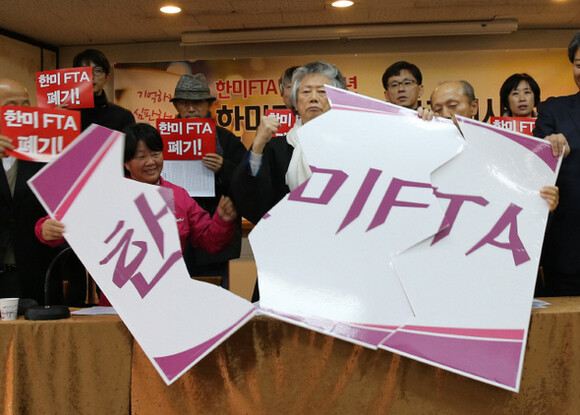hankyoreh
Links to other country sites 다른 나라 사이트 링크
Private equity fund launches first investor-state dispute claim against Korea

By Lee Jeong-hun, staff reporter
Lone Star Funds lodged an investor-state dispute (ISD) arbitration claim on Nov. 22 against the South Korean government.
The move by the US private equity fund was jointly announced by six governmental bodies: the Office of the Prime Minister, Ministry of Strategy and Finance, Ministry of Foreign Affairs and Trade, Ministry of Justice, Financial Services Commission, and National Tax Agency.
“On November 21 (US local time), Lone Star filed for international arbitration with the International Centre for Settlement of Investment Disputes (ICSID), an international arbitration body, against the South Korean government on the grounds that it violated the bilateral investment treaty between South Korea and Belgium/Luxembourg,” the agencies said.
With this, South Korea will for the first time go through ISD arbitration trials in the 45 years since it joined ICSID in 1967.
On May 22, Lone Star filed a letter of intent to pursue arbitration with the South Korean embassy in Belgium, claiming it suffered billions of euros in losses through arbitrary and discriminatory measures by the South Korean government during its sale of Korea Exchange Bank. The lawsuit, which comes at the end of a six-month “cooling-off period,” begins a battle between Lone Star and Seoul trillions of won at stake.
The six governmental bodies said the South Korean government did not acknowledge the legitimacy of Lone Star’s claims in the dispute.
They went on to say the government “formed a task force of officials from the relevant ministries in preparation for an arbitration hearing after Lone Star announced its intent in May, and it intends to commit its energies fully to the arbitration going ahead, actively demonstrating the illegitimacy of Lone Star’s argument before the international court of arbitration.”
The lawsuit shows that Seoul is now within striking range of an investor-state dispute. It finds itself at risk of the kind of threats to sovereignty in public policy and the courts that civic groups and experts had warned about.
Attorney Song Gi-ho, a trade law expert, said the lawsuit was an international rather than domestic trial of government public policy and tax policy, despite being a matter of the national economy.
“In addition to the concerns about similar lawsuits to come, it also shows how the South Korean government now has to consider the possibility of investor-state disputes when formulating its national policy,” Song said.
Calls for amendments to investor-state dispute provisions in the South Korea-US Free Trade Agreement are also expected to grow louder.
Lee Hae-young, Hanshin University professor of international relations, said the KORUS FTA had “many more toxic provisions” than the bilateral agreement with Belgium on which Lone Star based its suit.
“We need an immediate full-scale reexamination of the investor-state dispute system,” Lee said.
Please direct questions or comments to [english@hani.co.kr]

Editorial・opinion
![[Column] Has Korea, too, crossed the Rubicon on China? [Column] Has Korea, too, crossed the Rubicon on China?](https://flexible.img.hani.co.kr/flexible/normal/500/300/imgdb/original/2024/0419/9317135153409185.jpg) [Column] Has Korea, too, crossed the Rubicon on China?
[Column] Has Korea, too, crossed the Rubicon on China?![[Correspondent’s column] In Japan’s alliance with US, echoes of its past alliances with UK [Correspondent’s column] In Japan’s alliance with US, echoes of its past alliances with UK](https://flexible.img.hani.co.kr/flexible/normal/500/300/imgdb/original/2024/0419/2317135166563519.jpg) [Correspondent’s column] In Japan’s alliance with US, echoes of its past alliances with UK
[Correspondent’s column] In Japan’s alliance with US, echoes of its past alliances with UK- [Editorial] Does Yoon think the Korean public is wrong?
- [Editorial] As it bolsters its alliance with US, Japan must be accountable for past
- [Guest essay] Amending the Constitution is Yoon’s key to leaving office in public’s good graces
- [Editorial] 10 years on, lessons of Sewol tragedy must never be forgotten
- [Column] A death blow to Korea’s prosecutor politics
- [Correspondent’s column] The US and the end of Japanese pacifism
- [Guest essay] How Korea turned its trainee doctors into monsters
- [Guest essay] As someone who helped forge Seoul-Moscow ties, their status today troubles me
Most viewed articles
- 1[Column] The clock is ticking for Korea’s first lady
- 2Hong Se-hwa, voice for tolerance whose memoir of exile touched a chord, dies at 76
- 3[Column] Has Korea, too, crossed the Rubicon on China?
- 4After 2 months of delayed, denied medical care, Koreans worry worst may be yet to come
- 5[Correspondent’s column] In Japan’s alliance with US, echoes of its past alliances with UK
- 6US overtakes China as Korea’s top export market, prompting trade sanction jitters
- 7All eyes on Xiaomi after it pulls off EV that Apple couldn’t
- 8[Photo] Smile ambassador, you’re on camera
- 9Samsung barricades office as unionized workers strike for better conditions
- 10S. Korea “monitoring developments” after report of secret Chinese police station in Seoul